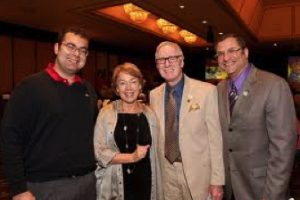On Saturday morning, November 19, a group of 40 of us gathered in a small classroom at the City College Campus in downtown San Francisco. This was the formation of the AASCEND Job Club, a Job Club for adults on the autistic spectrum.
Earlier this year, an F&H posting on California autism activist Dr. Lou Vismara had issued a call for employment strategies for adults with autism. Several persons had volunteered the idea of the Job Club. The Job Club does not require any new government money. It relies on members sharing job leads and strategies, as well as sharing moral support. It is a successful proven strategy in the California workforce world, and is evolving with the use of new job search technology and social media. AASCEND (Autism, Asperger’s Syndrome Coalition for Education, Network and Development), and its co-chair Ms. Camilla Bixler, agreed to host the Job Club.
I arrived early and sat next to Mark Jessen. Mark lives in Hayward. He worked in the Information Technology field for fifteen years, as a consultant. His business partner, who was responsible for business development, passed away four years ago, and the company fell apart. Mark has not worked steadily since, and heard about the ASSCEND Club from his counselor at the California Department of Rehabilitation.
As we went around the room and introduced ourselves, the employment stories varied. A number of participants held part-time or full-time jobs (office clerk, part-time grocery checker, part-time custodial) and were looking at full-time or advancement opportunities. A greater number, like Mark, had work experience but had been without steady work for more than two years. Still others were completing a junior college or state university and trying to find a next step.
The main theme running throughout all of the stories was the tenuousness of the labor market connection .
A few participants had turned to creating their own micro-businesses: a handyman business, a home computer network business, a tutoring business. But these businesses also were defined by a tenuousness and marginality. The participants generally were able to do the work tasks, but were not successful in selling themselves and generating paid assignments.
The discussion turned to job search techniques, the rise of the internet job boards and social media, and how to get the attention of employers, when each job listing brings forth tens or hundreds of resumes. Joel Brodsky, a veteran AASCEND member from Oakland, discussed Bay Area job coach Martin Nemko’s ideas about identifying firms and finding contacts in these firms, to distinguish oneself. Greg Yates, an AASCEND co-chair, suggested coaching and background efforts to succeed in interview.
The discussion then veered to questioning whether adults in the autism community should try to “get by” or “pass” in resumes or interviews. What of the unusual skills and insights that adults with autism might bring to a company? Rather than respond to job openings, what of contacting employers to highlight these skills? How might such an alternate job search process proceed?
Our next meeting will be on December 10. In the meantime, participants are to provide background information, on their employment history, current situation and employment goals. Ms. Laura Shumaker, who writes the autism blog for the San Francisco Chronicle attended the first meeting and volunteered to help with job placement, as did Ms. Cindy Zoeller, a vocational counselor from Sacramento, who specializes in job placement for persons on the autistic spectrum.
I have no idea how this Autism Job Club will evolve, or what will be the results. But in a small classroom at Fourth and Mission streets, with a still small-but-emerging adult autism community of Northern California, this is how it starts.


